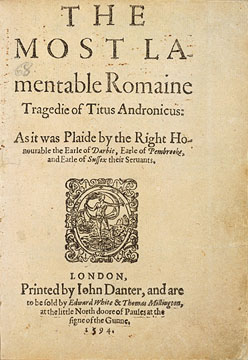Dr. Michael Delahoyde
Washington State University
TITUS ANDRONICUS
ACT III
SCENE i
Judges, Senators, and Tribunes bring Titus' two bound sons to the place
of execution. Lying down before the officials, Titus tries to stop them
with reminders of his service to Rome, but they pass by. He begs the
earth not to drink the blood of his sons.
O earth, I will befriend thee more with rain,
That shall distill from these two ancient urns,
Than youthful April shall with all his show'rs.
In summer's drought I'll drop upon thee still....
(III.i.16-19)
The latter two lines echo Chaucer again. Lucius arrives and tells Titus
that no one is listening to him: "The tribunes hear you not, no man is
by, / And you recount your sorrow to a stone" (III.i.28-29). Titus
justifies his pleading with stones: "A stone is silent, and offendeth
not, / And tribunes with their tongues doom men to death" (III.i.46-47).
Lucius reports that he has been banished because of an attempt to save
his brothers, which Titus thinks fortunate since the "wilderness of
tigers" (III.i.54) is preying on the Andronicus family: "How happy art
thou then, / From these devourers to be banished" (III.i.56-57).
|

|
That Titus is unheard serves as an interesting precursor to the next
development: Marcus bringing in Lavinia. "Elsewhere in Shakespeare we
will encounter the phenomenon of speechlessness as a sign of loss --
or abdication -- of full human capacity" (Garber 79). Lucius is stricken
with woe: "Ay me, this object kills me" (III.i.64). "Robbed of the means
either to speak or to write, Lavinia becomes an object rather than a
subject" (Garber 79). Titus rages; his impulse is to chop off his own
hands, "For they have fought for Rome, and all in vain" (III.i.73). They
can tell by her weeping that it wasn't the Andronicus brothers who killed
Bassianus, although Titus' emotional caving just makes Lavinia more
sorrowful, as Lucius notes. Something about this scene makes the elder
Ogburns think of Titus as Oxford and Marcus as his court mentor, the Earl
of Sussex (Ogburn and Ogburn 354). They mention the symbolic nature of
the "violation" of Anne Cecil, at least her reputation (Ogburn and Ogburn
354).
Aaron comes along and delivers to the Andronici the Emperor's decree:
that if any one of them will send his severed hand to Saturninus, the
emperor will reverse his decision about the condemned sons. Titus, Lucius,
and Marcus vie for the privilege of rendering forth the bloody ransom, but
when the latter two go off to find an axe, Titus has Aaron chop off his
hand. Aaron's side-comments indicate this is a hoax and only the severed
heads of the sons will be returned.
Indeed, a messenger brings the two heads of his sons to Titus, along
with his own severed hand and a report that the hand sacrifice was
mocked. Oddly and extraneously, this messenger adds, "woe is me to
think upon thy woes, / More than remembrance of my father's death"
(III.i.239-240). Lavinia kisses Titus, who wonders when the nightmare
will end. Marcus now is no longer stoical. Titus can only laugh, and
he turns entirely to revenge. He has Marcus carry off one head, he
carries another, and Lavinia brings the hand in her teeth.
[This is the Folio reading; the first quarto edition has Titus
telling Lavinia to carry the severed hand "between thine arms,"
which may strike one as less animalistic (Garber 83).]
In Titus's tending of Lavinia there has been both genuine affection
and a certain invasiveness as he tries to read her thoughts and speak
for her. Now that invasiveness is externalized in an image that, like
the sight of Marcus's staff in her mouth, reenacts the original
atrocity, just as the original rape in Rome anticipated it. (Leggatt
246-247)
The banished Lucius is to raise an army of Goths. He goes off vowing
to avenge the wrongs done his family, "And make proud Saturninus and
his emperess / Beg at the gates, like Tarquin and his queen"
(III.i.297-298).
SCENE ii
Titus, Marcus, Lavinia, and Lucius' son (young Lucius) sit down to a
meal. Titus speaks of their limited abilities to express their woe.
He seems to be able to interpret Lavinia's insistence that she'll
drink only her own tears, and he vows to find a way to communicate
further with Lavinia. From her signs, "I, of these, will wrest an
alphabet, / And by still practice learn to know thy meaning"
(III.ii.44-45). Marcus expresses concern that the boy is worried
about his grandfather Titus' sorrow. Marcus stabs a fly, and Titus
is angry: it is an act of murder and tyranny; the fly had a family.
But Marcus compares the fly to Aaron and Titus begs pardon, borrowing
a knife to smash the insect further. Some think this scene of "harming
a fly" was a later addition to the play, prompted by a small remark
occurring later into a literalization here (V.i.140).
Marcus thinks the grief is making Titus insane. Titus says he'll read
"Sad stories chanced in the time of old" (III.ii.83) to Lavinia until
he grows too weary; then the boy will take over:
Come, boy, and go with me, thy sight is young,
And thou shalt read when mine begin to dazzle.
(III.ii.84-85)
Act IV
Shakespeare Index
